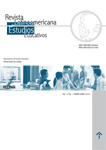Authors
Abstract
The goals proposed in this article are to improve the critical thinking skills learning process through education and assess whether the materials used in the ARDESOS program and the DIAPROVE methodology influence performance in critical thinking and motivation. To achieve these goals, different materials for each program were developed in order to improve the effectiveness of critical thinking from the DIAPROVE technique. The influence of the different approaches to intervention in motivation and performance in critical thinking skills was also evaluated. The critical thinking results show that the DIAPROVE methodology obtained better scores than ARDESOS in most of the PENCRISAL test factors and the performance factors in the subject. However, in motivation the DIAPROVE group only gets better results than ARDESOS in one of the motivation factors.
Keywords
References
Morales-Bueno, P., & Gómez-Nocetti, V. (2012). Adaptación de la Escala Atribucional de Motivación de Logro de Manassero y Vázquez. Educación y educadores, 12(3), 33-52.
Olivares, S., Saiz, C., & Rivas, S. F. (2013). Encouragement for thinking critically. (Motivar para pensar críticamente). Electronic Journal of Research in Educational Psychology, 11(2), 367-394.
Rivas, S. F., & Saiz, C. (2010). ¿Es posible evaluar la capacidad de pensar críticamente en la vida cotidiana? En Jales, H. R. & Neves, J. (Eds.). O Lugar da Lógica e da Argumentação no Ensino da Filosofia (p.53-74). Coimbra: Unidade I&D, Linguagem, Interpretação e Filosofia.
Rivas, S. F., & Saiz, C. (2012). Validación y propiedades psicométricas de la prueba de pensamiento crítico PENCRISAL. Revista Electrónica de Metodología Aplicada, 17(1), 18-34.
Rivas, S. F., & Saiz, C. (2015). ¿Perduran en el tiempo las habilidades de pensamiento crítico adquiridas mediante instrucción? En Domínguez, C. (ed.). Pensamento crítico na educação: Desafios atuais. (Critical thinking in education: Actual challenges) (p.137-144). Vila Real: UTAD.
Rivas, S. F., & Saiz, C. (2016). Permanence of the effect of teaching critical thinking. International Journal for the Scholarship of Teaching and Learning, 5(1), 240-248.
Saiz, C. (2015). Efficay, the heart of critical thinking. En Domínguez, C. (ed.). Pensamento crítico na educação: Desafios atuais. (Critical thinking in education: Actual challenges) (p.159-168. Vila Real: UTAD.
Saiz, C., & Rivas, S. F. (2008). Evaluación del pensamiento crítico: una propuesta para diferenciar formas de pensar. (Assessment in critical thinking: a proposal for differentiating ways of thinking). Ergo, Nueva Época, 22-23, 25-66.
Saiz, C., & Rivas, S. F. (2011). Evaluation of the ARDESOS program: an initiative to improve critical thinking skills. Journal of the Scholarship of Teaching and Learning, 11(2), 34-51.
Saiz, C., & Rivas, S. F. (2012). Pensamiento crítico y aprendizaje basado en problemas. Revista de Docencia Universitaria, 10(3), 325-346.
Saiz, C., & Rivas, S. F. (2016). New teaching techniques to improve critical thinking. The DIAPROVE methodology. Educational Research Quarterly, 40(1), 3-36.
Saiz, C., Rivas, S. F., & Olivares, S. (2015). Collaborative learning supported by rubrics improves critical thinking. Journal of the Scholarship of Teaching and Learning, 15(1), 10-19.

 PDF (Español)
PDF (Español)
 FLIP
FLIP




















